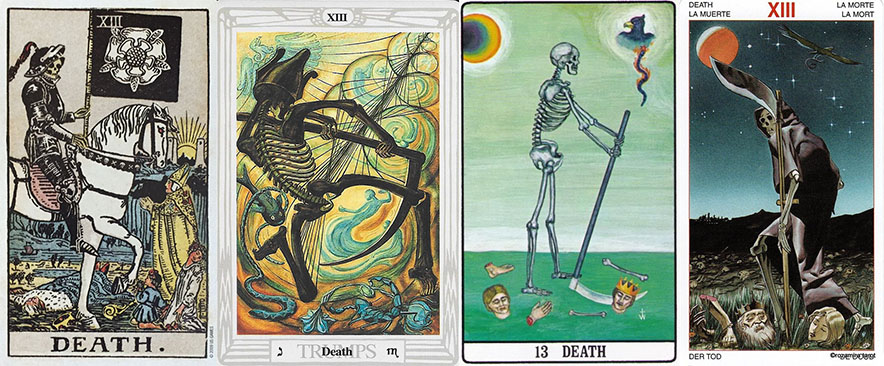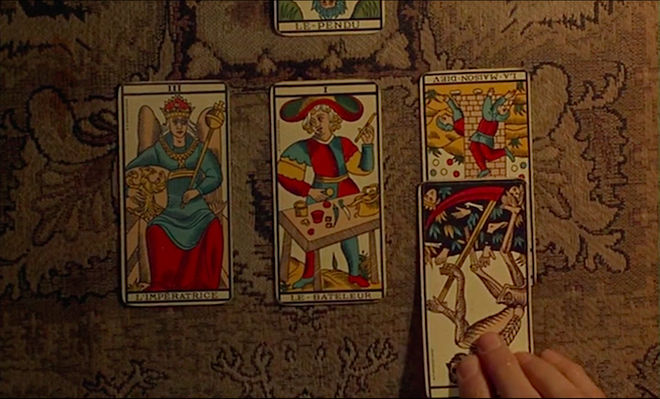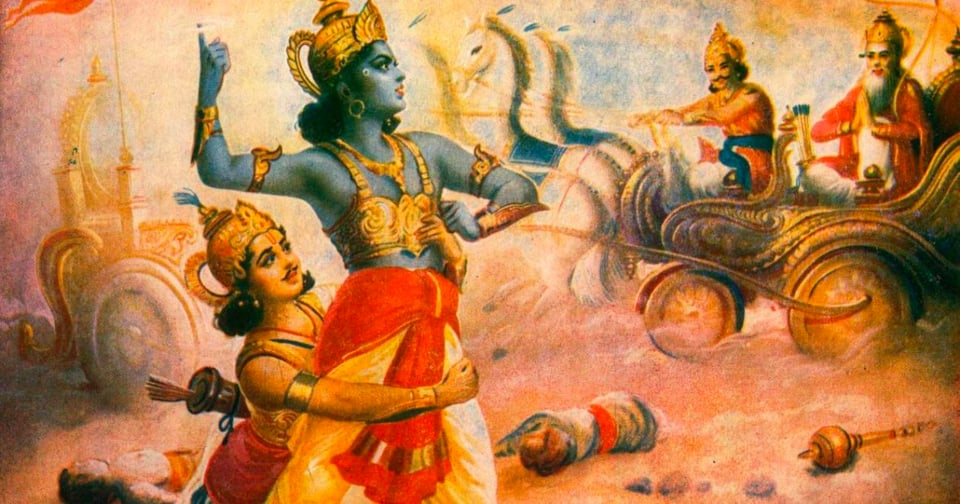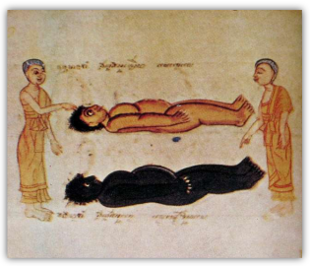
I've been listening to too much Ram Dass, because every time I think about sitting down to actually finish writing this, I immediately think "yeah, but who am I?" And then I don't do it. Everybody thinks they're somebody doing something. What the hell does it matter?
My birthday just happened, late in October. (I am now 35, apparently my "karmic year.") This makes me a Scorpio; according to the system of astrological correspondences in the tarot, my birth card is Death. Death can signify literal, biological death, as it seems to in the opening sequence of Cléo from 5 to 7.

This isn't the deeper meaning of the card, however. You don't need to be some kind of new age longhair to abstract from biological death to the underlying principle of transformation. Rachel Pollack specifically refers to the part of the ego that resists transformation in her book about the tarot. Here's what I wrote on this very subject in my notebook when I was tripping on the Fourth of July this year:
The wisdom in anything... the wisdom of knowing the transformation from body to dirt to another body with a different life in it. Human beings are SWAMP THING. The atoms of our bodies, dissolving from our bodies, becoming other things... tarot can seem so silly but that's how intense and unfathomable the "transformation" they're always referring to really is. Centuries, eons in the earth's dark mucky interior. The earth has something darkly sinister and Norse about it. Cold, entombing. I'm living out my days as a surfer on a cosmic explosion living inside a house & worried about stuff all the time.
The ego resists death. Rachel Pollack literally says it like that, "the ego resists death." There are lots of ways through the portal of transformation. There's dying, obviously. There's drugs. Near death experiences, certainly. And most importantly, most accessibly, suffering. Ram Dass says a lot about suffering. One of his aphorisms that has always stuck with me is that, in re: suffering, who you think you are can't endure it, but who you really are, can. In the process, who you think you are has to die. This is the process of healing, and the process of awakening, all at once. Siddhartha, in Hesse's book, realizes near the end of his life's journey that everything not suffered fully, to its full extent and completion, comes back (nice repressed you got there, be a shame if it... returned). Suffering something fully is the way to get free of it. The way this feels in the psychedelic experience is (for me) approaching some big fear, some thought that is troublesome, and putting my hand through it, in fact walking through it. That moment is accompanied by an embodied realization that whatever "it" is is an apparition, just a puff of vapor, and you can just walk through the door. (On my most recent mushroom trip, I specifically did not do this... approaching this experience, thinking about something hard and violent, I turned around and walked away rather than letting myself be engulfed. I felt guilty or rather slightly wussy about this, which is interesting.) At higher and higher doses, this experience comes to resemble actual death -- ego dissolution or "ego death" being the name we give it.
In his book The Divided Self, iconoclastic anti-psychiatrist RD Laing argues that the "ontological insecurity" of the self is a fundamental characteristic of schizoid thought processes and schizophrenia itself. Laing attempts to understand and make sense of the symptoms of "schizophrenic" and "psychotic" patients (quotation marks to emphasize the ontological uncertainty of these pathological/diagnostic categories themselves) by understanding their behavior and speech in the context of their tenuous sense of self in the body, in the mind, and in relation to other people. It makes sense from this perspective why psychedelic drugs can sometimes (this is what I read on Erowid circa 2006 anyway) trigger schizoaffective or psychotic episodes. Given the right dose, the right moment, the right setting, these substances can radically destabilize and even solvate the ego, another word for the thinking mind, which is what we think the self is. (I say solvate on purpose, to draw attention to the reversibility of the process of dissolution, analogous to the process of ego dissolution and recomposition through psychedelic experience.)
RD Laing also wrote about his patients' dreams, specifically the dreams that precede the onset of a psychotic episode by a few days. Some of the most commonly reported dreams involve fire; they dream that their bodies are burning, being engulfed by flame just as the outside world threatens to engulf the ontologically unstable self of the dreamer. Combustion is, of course, also a chemical process, an irreversible one. A reaction between a fuel -- can be any substance, some fuels burning hotter and faster than others -- and an oxidant, which is usually just the oxygen in the atmosphere. Oxygen is thus weirdly parallel to the old (1600s old) idea of phlogiston, the "fire element" in all combustible substances. (Talk about transformation: the atmosphere we can't live without is full of harsh, toxic, reactive oxygen -- which we also can't live without -- because for millions of years in the unfathomably distant past, anaerobic cyanobacteria simply photosynthesized, releasing oxygen as a waste product.) I don't even have time to get into the alchemical significance of fire but trust me that it's, uh, great.
What happens when you identify your self totally with someone else's? Heathcliff and Cathy syndrome -- jury's still out on whether that works better or worse when one of them is dead for most of the relationship. If they had both lived, what would their story be? Miserable, cyclical fights to the death over absolute nonsense that neither of them would, in their right minds, act so childish about; paradoxically, they'd begin to alienate themselves from each other, and therefore from parts of themselves. At this point Wuthering Heights becomes the Jonathan Franzen novel from hell. They can't stop, they keep going because they are so obsessed, as they are in the real book. Where in the book Heathcliff dashed his forehead on a tree trunk, begging Cathy's icy ghost to haunt him, in the Jonathan Franzen rework they'd be in couple's therapy, blaming each other to no end because each feels their self so strongly a part of the other that to be misapprehended in any way is to be totally effaced, threatened with disintegration -- burning up, transformation. Could Heathcliff handle the death of the person who was so attached to Cathy he felt he couldn't breathe without her? Clearly OG Heathcliff could not, he never let go, and turned cruel and vengeful instead, taking his suffering out on everyone else until the very last.
Who you think you are has to die sometimes. In the Upanishads, the ego or thinking mind is called the ahamkara, literally the "I-maker." Your thinking brain makes you think you exist as the thinker of your thoughts, the doer of your silly little errands. ("I am not the doer," I sigh to myself through gritted teeth as I drop my phone on my face lying in bed yet again.) Everybody thinks they're somebody doing something. This is the root of Arjuna's crisis in the Bhagavad Gita. It is Arjuna's dharma to fight and defeat the Kauravas. As Arjuna surveys the armies assembled on the battlefield, he sees that they are us -- if not literally his familial relatives (as some are), then what Ram Dass would call "God in drag," divine beings, people just like him. Arjuna consults on the plane of the subconscious with Lord Krishna, who has agreed to be Arjuna's charioteer; Krishna's voice is Arjuna's, since Krishna, a little spark of Source light, is our true self, the divine within.

Through the dialogue that composes the main part of the scripture, Krishna explains why Arjuna must fight, must stop thinking of himself as someone who does not kill his own relatives, must stop identifying himself with his thoughts and actions altogether. Towards the end, Krishna/Arjuna pulls out this banger: "Now I am become Death, destroyer of all." I learned from Eknath Easwaran's Bhagavad Gita that "Death" in this passage can also be translated as "Time." What Krishna is saying to Arjuna (what Arjuna is saying to himself) is -- look, this battle has already happened, these people are already dead. You think what you do matters, you think what you do says something about you, but it doesn't. The message boils down to: bitch, let go or be dragged! Interestingly, time, like fire, is also an agent and medium of transformation. (Also interestingly, the bombing of Hiroshima and Nagasaki, when an anonymous member of Oppenheimer's team of bomb-builders is said to have quoted this very passage, was death not by time, but by fire.)
Some Buddhists practice meditation on death. The Pali canon of Theravada Buddhism contains a specific meditation for this practice (mindfulness of death is called maranasati) focused on the nine stages of corpse decomposition. The meditator is (to my understanding) to envision the passage of their own body through these nine stages, to increase the mindfulness of death and to reduce attachment to the earth-bound body which, as we know, is not the self. Someone once told me that they do this -- practice meditation on death this way. I don't believe them. For one thing, the person isn't a serious practitioner of Buddhism in any way, more of a YouTube dabbler (no hate, aren't we all). For another... so you say.

It's one thing to meditate on death (we can generously categorize "thinking thoughts while driving" as meditating here), it's quite another to feel it. Rachel Pollack again: enlightenment is an experience, not a thought or a concept. It's one thing to talk cognitively about this stuff, using our cognitive brains and this nice abstract symbolic language we have. It's another to go the fuck through it, an experience of terror, abjection, grief, or suffering that cracks your ego open like a fresh egg.
Transformation is chemical alteration, it's thermodynamically and entropically irreversible. I always thought the title of Twin Peaks: The Return was such a cheeky little joke. Of course, there is no return. There is only transformation, only the crenellations and involution of time. When Cooper and Diane cross the invisible threshold at the end, they are transformed, passed into another dimension, and it's not as simple as retracing your steps back out. On a very prosaic note, this is an issue I have with Emergent Strategy and the emergent strategy people. They love to talk about being ready to "be transformed in service of the work." What work, though? Do you want to let yourself be transformed in service of some nonprofit board's strategic goals? I made that mistake once already, going to grad school. Although, it's not really a mistake. It's a portal, an opportunity, a passage, if you can keep your heart open enough to let it kill the person you think you are. Ram Dass says the worst thing you can do to another person is take away their suffering, unless they want you to.

This is why people go to tarot readers and psychics and crystal healers. To be told: "the events of your life have meaning." This is somewhat different than going to therapy; as RD Laing explains, there's a different intention embedded in two possible ways of seeing another being: as a person or as an organism. As a person, you see meaning, emotion, intention. As an organism, you see "signs and symptoms" of schizophrenia. In one of the NXIVM documentaries, someone said to poor India Oxenberg, very compassionately in my view, that being without meaning is terrifying. It is absolutely necessary to transformation that we can make meaning out of it. Trying to go through a soul process as if it were a pathological process is unsatisfying, at least in my experience. Let go or be dragged!
You just read issue #11 of Closed Form. You can also browse the full archives of this newsletter.
